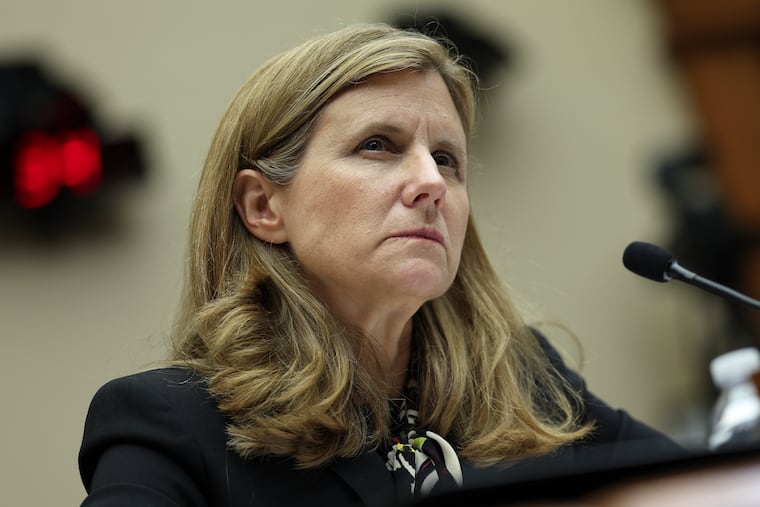Magill’s ouster is just the beginning of the attacks on open expression at universities
The censors won’t stop at Penn — they’re already targeting Harvard and MIT. At the heart of the debate lies a crucial question: Who will decide what speech counts as a call for genocide?

The forced resignation of Penn president Liz Magill exemplifies the threat to open expression at American universities. Penn is a particularly good case study because of the guidelines of its Committee on Open Expression, of which I was a member in the years before I left Penn for Berkeley.
The attack on Penn and Magill started with September’s Palestine Writes festival. Politicians, donors, and trustees demanded Penn cancel or dictate the speakers of the festival — something that would have flagrantly violated Penn’s rules.
Under the committee’s “Guidelines on Open Expression,” Penn “affirms, supports and cherishes the concepts of freedom of thought, inquiry, [and] speech.” And “the substance or the nature of the views expressed is not an appropriate basis for any restriction upon or encouragement of an assembly or a demonstration.” (Critically, none of this discussion applies to incitement, threats, or harassment targeted at specific people, which are not protected speech even under the First Amendment.)
In 2015, the committee — chaired by law professor Stephanos Bibas, now a judge on the U.S. Court of Appeals for the Third Circuit — approved an important interpretation of its guidelines. It forbids members of Penn’s community from going “beyond criticism to exert any duress on” an “event organizer or speaker to withdraw.” The guidelines define the university community to include trustees and boards such as Wharton’s Board of Advisors.
So calls to cancel or censor the festival asked the university to violate its own rules. But what about other university policies? Can’t the university censor to create a safe environment for people who believe the festival’s speakers are dangerous? Shouldn’t open expression give way to these concerns?
The guidelines say no: “In case of conflict between the principles of the Guidelines on Open Expression and other University policies, the principles of the Guidelines shall take precedence.”
Although Penn refused calls to violate its guidelines in the Palestine Writes episode, only a few weeks later, it did violate those policies. It forbade the Penn Chavurah student group from showing the movie Israelism and continues to violate its policies by threatening to punish those who did show the movie at a duly reserved room and time. Ted Ruger, Penn Carey Law School’s then-dean, also violated the guidelines in 2022 when, asking Penn to punish law professor Amy Wax, he included a charge specifically for inviting a white nationalist to speak to her course on conservative legal thought.
It’s an ugly record, and that’s just in the last two years.
When Wharton’s Board of Advisors called for Magill to resign, it demanded that Penn “change any policies that” allow “any call for harm to any group of people” and “discipline all offenders expeditiously.” This policy not only violates the guidelines, it would be impossible to administer. (A “call to destroy Hamas” would also violate the board’s demanded policy.)
» READ MORE: Liz Magill’s ouster at Penn will help the worst people take down free speech, higher ed | Will Bunch
Now law professor Claire Finkelstein says, in a Sunday op-ed in the Washington Post, that “Privileging free speech on campus relative to other values … fails to cultivate the skills democratic societies most need.” She concludes that it’s “time for university presidents to rethink the role that open expression and academic freedom play in the educational mission of their institutions.” Remarkably, Finkelstein is a member of the very Committee on Open Expression whose guidelines she favors ignoring.
Many critics have accused Penn of long-standing hypocrisy and double standards in applying its policies. However much one agrees, there’s no question that Penn is now in crisis.
The censors won’t stop at Penn.
The censors won’t stop at Penn — they’re already targeting Harvard and MIT. Nor will they stop at private universities. They’re coming for all of higher education — including public universities that, as state institutions, are bound by the First Amendment. And then what?
Like any other decent person, I react with emotion when I hear a call for genocide. But emotion can obscure a critical question: Who will decide what speech counts as a call for genocide?
Those favoring censorship in this instance define a wide array of speech as genocidal, even though the speakers insist they are not at all calling for genocide. Maybe you agree with today’s censors. But will you agree with tomorrow’s? And if you believe universities have long failed to protect free expression, do you want more power in the hands of yesterday’s?
Jonah B. Gelbach is the Herman F. Selvin Professor of Law at the University of California, Berkeley School of Law. He was a member of the faculty at Penn’s Carey Law School from 2013 to 2019.